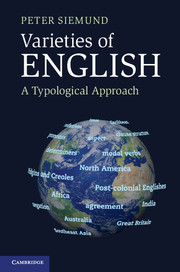Book contents
- Frontmatter
- Contents
- List of figures
- List of tables
- Acknowledgements
- How to use this book
- Abbreviations
- 1 Introduction
- 2 Reflexivity and reflexive marking
- 3 Pronominal gender
- 4 Pronominal case
- 5 Determiners
- 6 Tense marking
- 7 Aspect marking
- 8 Modal verbs
- 9 Negation
- 10 Subject-verb agreement
- 11 Ditransitive constructions
- 12 Interrogative constructions
- 13 The formation of relative clauses
- 14 Summary and outlook
- General references
- Index of languages, varieties, and areas
- Index of names
- Subject index
- References
13 - The formation of relative clauses
Published online by Cambridge University Press: 05 May 2013
- Frontmatter
- Contents
- List of figures
- List of tables
- Acknowledgements
- How to use this book
- Abbreviations
- 1 Introduction
- 2 Reflexivity and reflexive marking
- 3 Pronominal gender
- 4 Pronominal case
- 5 Determiners
- 6 Tense marking
- 7 Aspect marking
- 8 Modal verbs
- 9 Negation
- 10 Subject-verb agreement
- 11 Ditransitive constructions
- 12 Interrogative constructions
- 13 The formation of relative clauses
- 14 Summary and outlook
- General references
- Index of languages, varieties, and areas
- Index of names
- Subject index
- References
Summary
The term ‘relativisation’ as a grammatical term refers to the modification of a noun phrase through a finite clause (the book that I read). Such modifying clauses are known as ‘relative clauses’ and typically occur after the noun they modify. The formation of relative clauses is a fascinating topic even in standard English, though various additional dimensions come into play once we extend the discussion to non-standard varieties. Moreover, relative clauses have been profoundly investigated from a cross-linguistic perspective, and principles of rather surprising generality have been proposed for this domain of grammar that inform the discussion of English and its varieties in interesting ways.
Some basic definitions
As stated above, relative clauses belong to the area of nominal modification. However, this categorisation does not do justice to the complex properties of these constructions, as there are non-trivial syntactic relations between the relative clause and the noun thus modified. Generally speaking, the modified noun, in addition to being modified, also plays a syntactic role in the relative clause. Let us consider a few examples, starting with the ditransitive sentence in (1).
Information
- Type
- Chapter
- Information
- Varieties of EnglishA Typological Approach, pp. 258 - 277Publisher: Cambridge University PressPrint publication year: 2013
